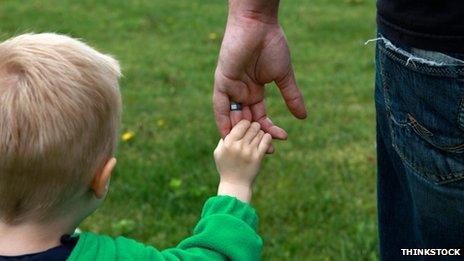'More children go missing' from foster carers
- Published

The foster carer takes the role of the parent
There was a large increase in the instances of children going missing from foster homes last year, Ofsted statistics show.
Children went missing from foster care on 13,305 occasions in 2013-14 - a 36% rise on the previous year.
Nearly six out of 10 missing cases were from independent fostering agencies, rather than a local authority, which have just under a third of placements.
The government now collects data on children who go missing from care.
The risks children face if they go missing from care were highlighted by the Rotherham child abuse case. At least 1,400 children were abused in the South Yorkshire town from 1997 to 2013.
'Complex needs'
According to the Ofsted statistics, during the year 2013-14, 4,245 children and young people were reported to have gone missing from foster care - 900 more than in the previous year.
Contact with family or friends was the reason given in nearly half (6,596) the cases.
And most of them went missing for less than a day.
However, 528 of these children who did go missing were deemed to be at risk of sexual exploitation, and 431 of the cases were said to be linked to substance misuse.
There was also a big increase last year in foster placements breaking down - up 21% on the previous year to 5,240. Although there has been a change in the way these are counted.
Earlier this week, Barnardo's chief executive Javed Khan said social workers were struggling to find the time to provide agencies with enough information to match troubled and vulnerable children with the right foster carers.
'Safety most important'
"Placements break down quickly when children with problems and complex needs are placed with the wrong family. The children often get returned to their birth families or moved to another set of carers - only to be removed again at a later stage.
"Some children get put on a merry go round of placements which is anything but merry. Each move to a new family distresses the child further and stores up behavioural problems for the future. Moves can also disrupt children's education and ability to sustain friendships.
"It's becoming harder to find families for children in care. Two things need to happen to avert a crisis.
"We need to work together so we can prepare carers better to meet the needs of the children they foster. And we need to look at the changing reasons why children are being taken into care - like sexual exploitation - and plan how we're going to respond to that."
A Department for Education spokesman said: "We are absolutely clear that there is nothing more important than keeping children safe.
"That is why we have placed a duty on councils to interview children who return from going missing within 72 hours, and for the first time ever we are collecting national data for all children who go missing from care, not just those missing for 24 hours.
"We have also repeatedly written to councils telling them they must improve the quality of data on children missing from care."